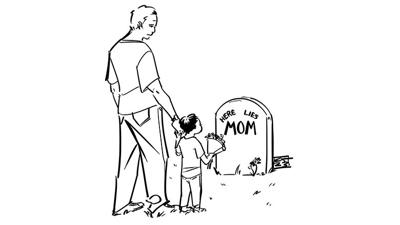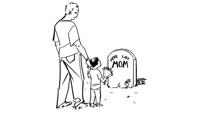One evening in April 2022, I stood in my bathroom looking at three positive pregnancy tests in disbelief. I called my husband in to look at them. He thought I was showing him I had COVID.
While we had been hoping for this result, it was quite unexpected. I was diagnosed with polycystic ovarian syndrome (PCOS) when I was 19, and my doctor told me it was very unlikely I would ever conceive.
Besides my disease, I was relatively old (35 by the time I would give birth) and overweight (a common feature of PCOS). These factors placed me in a high-risk category, so I was more likely to miscarry if I were to become pregnant.
PCOS also presented a much higher risk of ectopic pregnancy, which is when the fertilized egg implants outside the uterus. The egg can’t survive there. If left to grow, it may damage nearby organs and cause an extreme loss of blood. Ectopic pregnancies are the No. 1 cause of maternal death in the first trimester.
This was not just dry data to me. For years, I read heart-wrenching posts from friends about their struggles with multiple miscarriages. I had rushed to the hospital to visit a friend with an ectopic pregnancy that shredded through her fallopian tube and left her on death’s doorstep.
So, when my tests were positive, my husband and I tried not to get our hopes up too much. It seemed just as likely as not I would eventually land in the ER with nothing to take home except an empty uterus, a broken heart and an unconscionably high hospital bill.
We told almost no one. If we didn’t share our good news, we wouldn’t have to tell anyone when our joy turned to grief.
Within a couple of weeks, a Supreme Court ruling was leaked.
I listened in horror as I heard people, including Missouri politicians, saying if somebody died of an ectopic pregnancy it was “God’s will” and they should not be able to receive a life-saving abortion.
I heard stories of miscarriages being criminally investigated and worried if that was going to become the new normal. I sat in my living room (probably somewhat fueled by pregnancy hormones) sobbing to my husband that our baby was going to die and I was going to go to jail.
Then Roe v. Wade was overturned and some of the most extreme abortion laws in the country went into effect in Missouri.
I heard commentators say, “If you want an abortion, you can just go to a different state!”
I didn’t want an abortion.
I heard the following quote, which stuck with me: “No woman wants an abortion as she wants an ice cream cone or a Porsche. She wants an abortion as an animal caught in a trap wants to gnaw off its own leg.”
I didn’t want to gnaw off my own leg. I wanted access to life-saving health care if needed, which, although some people don’t want to accept it, includes abortion.
Do you know what the treatment is for ectopic pregnancy? Abortion. Septic miscarriage? Abortion. Miscarriage after 10 weeks? Abortion. Saying “Those aren’t abortions!” doesn’t make it true. By delaying or denying these abortions, women are left with permanent bodily harm or death.
“But there’s an exception for life of the mother!” I heard pro-lifers say.
What does that actually look like in practice? I heard interviews of doctors saying they don’t know where that line is now. Someone’s health doesn’t necessarily flip from healthy to “in danger” in an obvious manner. Often, it’s a slow deterioration, and doctors don’t know when along that path they’re legally allowed to intervene.
Stories came out of doctors on the phone for hours with lawyers to see how close to death they had to allow their patients to progress before they were allowed to act to “save the life of the mother.” I also heard stories about how women in sepsis or bleeding to death had to wait hours or days before their conditions were considered dire enough to deserve treatment.
I consented to being pregnant in a world where if my pregnancy went sideways, my doctor would be able to act quickly to mitigate permanent bodily harm to me. I consented to be pregnant in a world where the person making my medical decisions would have an “M.D.” behind their name, not someone who passed the bar exam.
As each week passed, I wondered to myself, “Is this the week I’ll die for wanting a baby?”
I spent a lot of time considering what to do if I started miscarrying. Would I be physically capable of driving to a hospital in Illinois?
Missouri lawmakers proposed bounty hunting anyone who tried.
Outside of miscarriage, pregnancy is still dangerous. Health risks include hemorrhaging, high blood pressure, gestational diabetes, infections, blood clots, depression and anxiety. My own labor lasted 53 hours and ultimately ended in a cesarean section, which carries its own risks. My complications had me at the hospital for nine days.
As wanted and loved as our child is, we will not try for a second. I would not consent to being pregnant again in a post-Roe world. At least not in Missouri, where the life and health of mothers is treated with so little regard. My son needs his mommy more than he needs a sibling.
We’ll never all agree on abortion. If you ask 10 people their opinion, you’re likely to get 10 different answers.
But maybe many of us can agree that how it works in Missouri now isn’t working at all.





